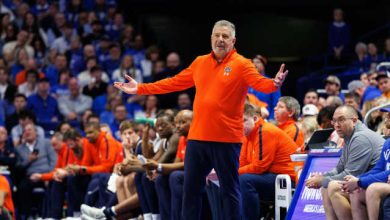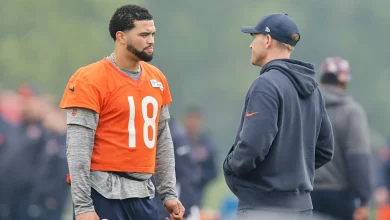Quinn Ewers declined an offer of $8 million to leave the Texas Longhorns.

In the fast-moving world of college football, few decisions are as impactful as the ones made by players at the top of their game. For quarterbacks, especially those with the pedigree of Quinn Ewers, the choices they make can alter the course of not only their careers but also the trajectory of their entire college football program. This is precisely what makes Ewers’ recent decision to decline an $8 million offer to leave the Texas Longhorns such a monumental moment in both college football and NIL (Name, Image, and Likeness) history.
Quinn Ewers, who has become one of the most highly talked-about quarterbacks in college football, faced a dilemma many players dream of: a lucrative offer to leave his current program and move on to greener pastures. An $8 million deal would set him up for life financially, but Ewers ultimately chose to remain with the Texas Longhorns. This decision not only speaks to his loyalty to his current program but also signals the growing influence of NIL deals, the ongoing transformation of college football, and the role of long-term career goals versus immediate financial reward.
In this article, we will explore the intricacies of Ewers’ decision, what it means for Texas, and how this scenario could have far-reaching consequences for the future of college athletics.
Quinn Ewers: The Rising Star
Quinn Ewers entered the college football world with massive expectations. As one of the top quarterbacks in the 2021 recruiting class, Ewers was highly regarded for his arm strength, poise under pressure, and football IQ. His high school career in Texas was nothing short of spectacular, making him one of the most hyped recruits in recent memory. Ewers’ decision to bypass his senior year of high school and enroll early at Ohio State was a bold move, but it paid off as he earned a spot in one of the top programs in the country.
However, after just one season in Columbus, Ewers made the decision to transfer to Texas, where he could be closer to home and play under head coach Steve Sarkisian, an offensive-minded coach known for developing quarterbacks. Ewers’ move to Texas was highly publicized, and it set the stage for what many believed would be an eventual transformation of the Texas Longhorns into a national powerhouse.
Upon arriving at Texas, Ewers immediately became the focal point of the Longhorns’ offense. His arm strength, ability to read defenses, and maturity on the field were evident from the start. While Ewers experienced some growing pains in his first year as a starter, his potential was undeniable. By his second season, Ewers had firmly entrenched himself as one of the most promising quarterbacks in college football.
Ewers’ rise at Texas has coincided with the Longhorns’ resurgence as a program. With strong recruiting classes under Sarkisian, a talented offense, and an improved defense, Texas was on the cusp of becoming a serious contender on the national stage. Ewers, as the team’s leader, was expected to play a pivotal role in helping the Longhorns reclaim their place among college football’s elite.
The $8 Million Offer: A Lucrative Temptation
In the modern college football landscape, the emergence of NIL deals has dramatically changed the way athletes view their careers. NIL agreements allow athletes to capitalize on their name, image, and likeness, generating significant income through sponsorships, advertisements, and other business ventures. For some athletes, these deals can become so lucrative that they start to outweigh the benefits of remaining in college football.
Quinn Ewers, as one of the most marketable quarterbacks in college football, was no stranger to the NIL landscape. With his high-profile status, it was inevitable that companies and organizations would want to partner with him. What was unexpected, however, was the reported $8 million offer that Ewers reportedly received to leave the Texas Longhorns.
The details of the offer were not immediately made public, but the speculation surrounding the deal has sent shockwaves through the college football world. The offer was allegedly from a well-established professional football organization or another college football program, aiming to entice Ewers to make a move that would secure him significant financial compensation while continuing to pursue his football career.
For Ewers, the temptation of such a lucrative offer would have been hard to ignore. An $8 million deal could provide him with financial security for life, even before he officially enters the NFL draft. In a sport where athletes are often not paid directly for their athletic performance (aside from NIL compensation), the chance to capitalize on a rare opportunity is something that many players would consider carefully.
However, in a decision that surprised many, Ewers turned down the $8 million offer and chose to remain with the Texas Longhorns.
Why Quinn Ewers Chose to Stay at Texas
Ewers’ decision to stay at Texas in the face of such a significant financial opportunity speaks volumes about his commitment to his long-term goals and his vision for his career. There are several reasons why Ewers may have chosen to reject the $8 million offer, including his loyalty to the Longhorns, his development under Steve Sarkisian, and his desire to enhance his draft stock ahead of the NFL draft.
- Loyalty to Texas and Its Program
One of the most important factors in Ewers’ decision to remain at Texas may be his loyalty to the program that has helped him grow as a player. Ewers arrived at Texas at a time when the program was in need of a leader—someone who could revive a team with high expectations but lacking a clear identity. As the quarterback of the Longhorns, Ewers has had the chance to build something special in Austin, creating bonds with his teammates and taking ownership of the offense.
Head coach Steve Sarkisian’s offensive system is also a major part of the equation. Sarkisian is known for his ability to develop quarterbacks, and he has a track record of turning quarterbacks into top NFL prospects. Ewers, under Sarkisian’s tutelage, is already showing significant improvement, and staying at Texas gives him the chance to continue that development while playing in a system tailored to his strengths. Sarkisian’s confidence in Ewers and their strong working relationship likely played a significant role in his decision to stay.
- Long-Term Career Goals
For a player like Ewers, who is widely projected to be a high pick in the NFL Draft, the key to his future success lies in how he performs on the field. While an $8 million deal could set him up financially, it might not guarantee him the kind of career stability that he would receive from performing at the highest level in college football. Ewers likely believes that staying at Texas and refining his game under Sarkisian’s guidance will ultimately increase his draft stock, providing him with the potential for an even larger payday in the future.
The NFL is the ultimate goal for many college football players, and for Ewers, staying at Texas provides him with the best opportunity to develop the skills necessary to succeed at the next level. With the Longhorns on the rise and a team built around his talents, Ewers has a chance to lead Texas to significant success in the coming seasons—success that would only boost his stock in the eyes of NFL scouts.
- The Changing NIL Landscape
While NIL deals have become a major force in college football recruiting, they are still relatively new, and the landscape continues to evolve. Ewers may have recognized that the long-term rewards of developing his game at Texas outweigh the immediate financial incentives offered by the $8 million deal. By remaining at Texas, Ewers has the potential to increase his earning power in the future, as NIL deals are expected to grow in size and scope as college football continues to adapt.
Additionally, staying at Texas allows Ewers to further establish his brand and build upon the significant following he has already developed. Texas, with its large fan base and high-profile football program, offers a platform that could elevate Ewers’ marketability and future earning potential. He may have calculated that by playing for the Longhorns, he will have more opportunities to capitalize on his NIL value while still progressing toward his ultimate goal of entering the NFL.
Impact on Texas Longhorns Football Program
Ewers’ decision to remain at Texas is a massive win for Steve Sarkisian and the Longhorns. It solidifies Ewers as the cornerstone of the program and gives Texas a clear leader on offense for the coming seasons. Ewers’ decision ensures that Texas will continue to have one of the most talented quarterbacks in college football at the helm, with the potential to challenge for conference and national championships.
With Ewers remaining in Austin, the Longhorns can focus on building around him, adding key pieces to the offense, and further establishing themselves as a contender on the national stage. The decision also reflects well on Sarkisian’s ability to not only recruit top-tier talent but to keep that talent in place. As Texas transitions into the SEC, having a proven quarterback like Ewers will be crucial to the program’s success in the nation’s most competitive conference.
The Bigger Picture: NIL and College Football
Ewers’ decision to decline the $8 million offer also highlights the growing power of NIL in shaping the future of college athletics. As more players gain access to lucrative NIL deals, it is likely that the landscape of college football will continue to evolve in ways we can’t yet fully predict. Ewers’ ability to turn down such a substantial offer suggests that athletes may start to prioritize long-term success and personal development over immediate financial gain.
While the $8 million deal offered to Ewers is exceptional, it also serves as a reminder of the potential for even greater deals to come. As NIL continues to shape the recruiting landscape, programs with significant resources will be able to offer athletes even more opportunities to monetize their careers, potentially complicating decisions for players as they balance their desire for financial security with their long-term goals.









